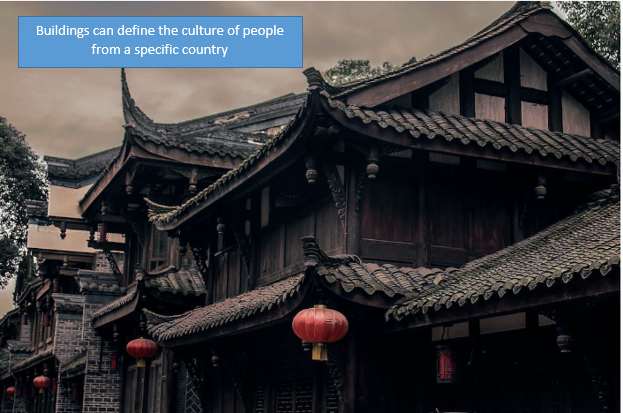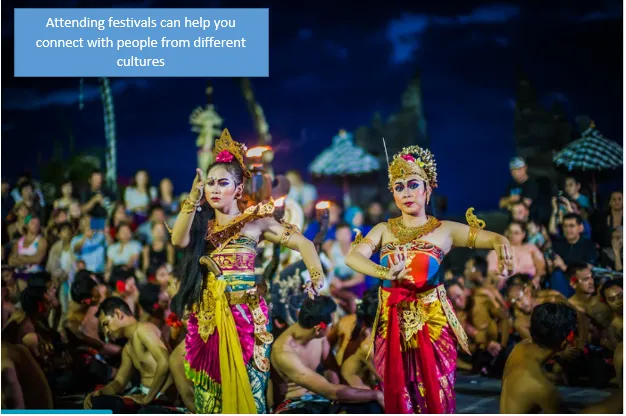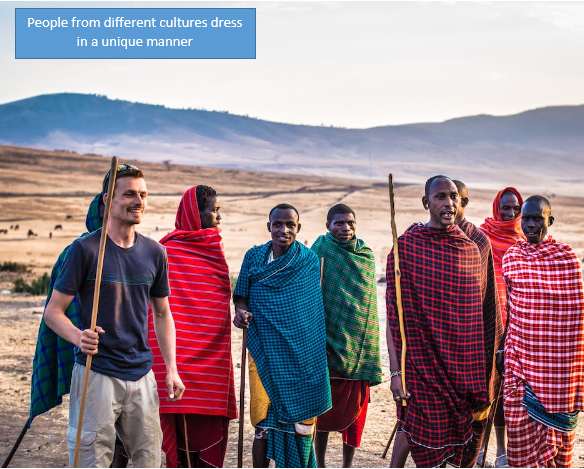随着世界变得比以往任何时候都更加多元文化,没有什么可以阻止你去了解不同的文化。
有了文化意识,你就能与周围的人进行更有针对性的互动。
除了让你更加尊重和同情他人,文化意识还能帮助你赞美自己的异同。
这意味着,你很难仅仅因为别人和你不属于同一个种族或文化而区别对待。
了解文化多样性有很多好处,本文将为您一一道来。
在多元文化活动或夏令营中亲自互动,是体验不同文化益处的最佳方式。
了解有关 Les Elfes 国际夏令营或冬令营的更多信息。
什么是文化?
Culture is the knowledge and traits of a specific group of people that defines their religion, language, social habits, arts, music, and cuisine. According to the Center for Advanced Research on Language Acquisition, culture is a shared standard of interactions, behaviors, understanding, and mental processes learned through socialization.
Cristina De Rossi, Barnet and Southgate College in London’s anthropologist, says, “Culture encompasses religion, food, what we wear, how we wear it, our language, marriage, music, what we believe is right or wrong, how we sit at the table, how we greet visitors, how we behave with loved ones and a million other things.”
了解不同文化的重要性
Promoting a culturally sensitive, accepting, and positive society allows you to adopt multiculturalism and reconsider old beliefs. You think about what you consider normal or abnormal and challenge yourself to view the world from a different mindset. So, why is it important to learn about different cultures?
Learning and understanding a different culture from your own is the first step towards eliminating judgment on someone or something you know nothing about. According to sociologists, understanding multiculturalism plays a significant role in helping you:
- Recognize that there are lots of different cultures and that they’re individually diverse
- Acknowledge that all cultural expressions and backgrounds are valid
- Respect the differences between you and people from other cultures
- Value everything that other cultures bring to the table
- Empower people to accomplish their ultimate potential by criticizing their own biases
- Celebrate each other instead of condoning our differences
为什么要了解不同文化?
Understanding a different culture gives you cultural sensitivity, and this helps you avoid embarrassment and misunderstanding. Of course, this is an invaluable skill in daily life. When you learn about other cultures, you widen your horizons, and this is a great way of consuming new information and viewing things differently.
And, knowing about other cultures makes you open-minded. You’ll have an easy time respecting and accepting their differences. Why is it important to respect other cultures? Being culturally aware is essential in today’s evolving world. So, you should accept every opportunity to learn and understand other cultures.
语言与文化之间的关系是什么?
Language and culture are closely connected. For starters, both terms describe a person, their habits, traditions, views, and nearly everything about their lives. While here, it’s important to understand that paralanguage is the nonlexical element of communication specific to different cultures. It’s a broad approach that includes the pitch and tone of your voice and body language. Paralanguage varies depending on your roots.
Did you know that you learn some intonations, expressions, and gestures from the people around you? Again, body language can be interpreted differently from one country to the other. For example, what’s interpreted as welcoming in one country can be seen as hostility in another.
As a result, paralanguage can trigger communication misunderstandings in various ethnic groups. Paralanguage impacts the language you speak and this explains the habits, gestures, and even voice changes for bilingual people.
– 影响思维过程
Linguistic relativity states the language you use in your discussions influences your perception of the world. For example, if you think and speak in Dutch, your view of the world will be different from the person who speaks Spanish. Bilingual people who use two languages daily may think in both languages, and this makes them more capable of viewing the world differently.
And they’re likely to understand it better from different sides. The culture you grew up in impacts your perception of the world. Your morals, values, logic, and mindset will be different from that of other people.
– 语言与文化的同源关系
There’s an imminent homologous relationship between culture and language. They both emerged and evolved together before humans could write. According to experts, “language is culture and culture is language.” There are numerous interconnections and history between language and culture.
The two have a huge influence on people’s lives. According to Elisa Abbott, translator and writer for PickWriters, to understand language you must understand culture, and vice versa. Language evolution had a direct impact on culture development and vice versa. The more cultured you are, the more advanced your language is.
– 跨文化互动
Today, interacting with other cultures is more common than ever before. What with the accessibility of travel and opportunities that encourage people to relocate to other countries? But what is the relationship between intercultural interactions and language?
Some language theories are not present in other languages, and the culture related to the language can impact this situation. Of course, when people from different cultures try to communicate, there’s likely to be a language barrier. Body language and habits people develop while growing influence inter-cultural relations.
– 同化与社会交流
Before numerous languages engulfed the world, large groups of people spoke core primary languages. Later the people evolved, and so did their language and culture. This they did because they needed to assimilate and adapt to new situations. Different dialects have developed following the influence of some cultures on others. An example of this would be that of Tome and Ancient Greece.
After the Romans captured Greece, the Greek language, culture, and religion highly influenced them. They ended up adopting the Greek pantheon of gods. Think about England and France. When the English people began speaking French with the English language adopting part of French’s vocabulary.
Today, 30% or English words come from French. Some tribes changed their language to become better than others or gain acceptance in a new land, and adopting the traditions and customs of the local people made this even easier.
– 变速箱
One of the easiest ways to learn a language is via oral communication and not writing. Children understand the basic theory of grammar and language way before they start schooling while relying on parents as their core sources.
When they begin preschool, they learn the basic components of their first language before learning the complex concepts and structures of their first or even second language in school. But the foundation is already there before school. Just like language, children, somehow inherit culture from their surroundings.
The family, the country, its citizens, traditions, and customs are responsible for this inheritance. A child incorporates everything they hear and see, even unconsciously. When they grow, children encounter written linguistic and cultural learning. Their minds correspond based on the books and the language they read.
If you’re bilingual, you’re likely to remember learning the languages because you use them in your daily life and process the information you get from written materials.
The linguistic differences of language can be classified into functional, social, and geographical. Geographical differences occur when a section of the language is commonly used in some areas of a community.
For instance, a language spoken in the western part of a country may be different from what the Easterners speak. On the other hand, occupation, age, and gender impact social differences. For instance, an office worker talks differently from a politician or even a professor.
Functional differences come from the function and circumstance the language is used in. Despite these differences, culture unites people speaking different forms of the same or even different languages.
Culture and language play a critical role in human life. We share numerous differences due to our varying individualities and identities. Still, there are many similarities that we have as a result of the connection between our language and culture.
了解不同文化能促进成长吗?
What is the importance of understanding cultural differences in business, and what can we learn from other cultures? When interacting with people from a different cultures, you learn about their community customs. And not only that, but you also understand their challenges.
Doing so allows you to rethink any stereotypes you may have had about these people. This knowledge promotes cultural competence and individual growth. And it encourages you to extract as much information as you can about your own culture. But how can you learn about different cultures?
Besides research, you can engage your friends on social media to discuss their cultural standards. Camping and traveling are some of the most practical and effective strategies you can use to learn about multiple cultures.
学习不同文化有什么好处?
If you are still asking yourself why is it important to interact with different cultures, here are the benefits.
– 提高文化意识
Being culturally aware teaches you how other cultures can help you based on collaboration or communication. Cultural consciousness is the idea of being aware and respecting the influences and roles of other cultures. This concept positively impacts every individual’s responsibilities and roles.
Again, it also helps you stop misjudging individuals from other cultural backgrounds. But why is it important to understand your own culture? Doing so helps you understand that being different from others doesn’t make your culture more superior than others. It also allows you to relate better with others without disagreement. Being culturally aware can be beneficial in various ways, including:
– 接触不同的视角
What is the significance of studying the different cultures of the country? It helps you recognize new outlooks that can result in innovative ideas. For instance, you may discover that some cultures have unique problem-solving approaches, which can inspire your way of thinking in various ways. Further, learning about a new culture helps you understand how people from other backgrounds view the world. Of course, this realization can help you think creatively and critically.
– 了解文化差异
Learning about other cultures promotes respect and tolerance. When you learn from another culture apart from your own, you learn about their beliefs and different perspectives. This can transform you into an empathetic and open-minded person. Eventually, you’ll have fewer disagreements and more valuable relationships. When you become culturally aware, you start supporting cultural differences and adopt new ways of coping in society. You’ll break all cultural barriers and connect respectfully with different communities.
– 欣赏多样性
Schools, workplaces, and countries, in general, comprise different ethnic, racial, and cultural groups. This diversity is an opportunity for people to learn from one another. When you learn from other people, your perspective on the world changes.
Besides dispelling personal biases, you also reconsider negative stereotypes you may have about people from a different cultural background. Being culturally diverse means, you can identify and respect practices that are different from yours.
As you interact with others, you can develop trust, knowledge, and respect across cultures. Dn’t you think such diversity makes the world a better place to live in? Of course, it does.
– 提高沟通技能
While language is crucial for human communication, other factors contribute to effective communication. These include presentation, speed, and figurative language. Also, culture influences how people express their body language and gestures.
You can enhance your communication skills by learning about different cultures. But how does effective communication help you connect with people from other cultures?
– 克服语言障碍
One of the core obstacles you’re likely to face when communicating with people from other cultures has to be language barrier. As the world becomes more connected, you’re likely to find yourself in a different country with a different culture than yours. In this case, it’s important to learn core words and phrases of that culture to ease communication.
Be open to learning and seeking clarification when you feel lost. Learning a new language is not easy, especially as an adult. But with patience, you can learn core words and communicate effectively.
– 文化差异与非语言交流
Non-verbal communication is critical in intercultural interactions. Every culture has a different interpretation of gestures, eye contact, and body language. For instance, direct eye contact is a sign of respect in some cultures. But other cultures see it as a sign of disrespect or aggressiveness. When you learn the basics of other cultures’ non-verbal cues, you edge closer to achieving effective communication.
– 建立牢固的关系
You can meet people in different ways, like attending camp, participating in events, and attending special day celebrations. This way, you can meet and interact with people from diverse cultures, expand your social circle, and learn about another culture.
– 增加职业机会
Part of understanding other cultures, as seen above, often involves moving to a new country and learning a different language. These factors increase your chances of landing career opportunities in different countries whenever they arise. More career opportunities result in:
– 全球化和多元文化工作环境
When you start exploring the world, you begin relating with and understanding people from other cultures. And this strengthens the cultural connection while limiting the risk of cultural conflicts. When you’re culturally aware you can understand what can be unsuitable to people with diverse backgrounds.
This facilitates globalization and reduces potential barriers. Remember, your culture influences how you view the world. Different perspectives, as well as different professional and personal experience of an international team, can provide varying viewpoints that inspire staff to view the world, and especially their workplace, differently.
Besides driving innovation, diversity of ideas breeds creativity, facilitating problem-solving and meeting customer needs in different ways. Creating a diverse yet inclusive workforce can help companies generate new ideas.
– 与不同团队合作的能力
A Glassdoor survey revealed that two-thirds of job applicants mentioned diversity as a crucial aspect to consider when analyzing job and company offers.
In today’s overly competitive job market, showing that your business is committed to fostering an inclusive and multicultural environment helps you attract the right candidates. Further, prioritizing diversity during the recruiting process widens your talent pool of potential employees.
If your workplace is diverse, your employees have a higher chance of remaining loyal, especially if they feel valued and respected for their contribution. Colleagues who understand the impact of the diverse culture, experiences, and perspectives of team members will be more respectful of one another. An all-inclusive multicultural environment is a great way to connect with teams and colleagues.
– 就业市场的竞争力
A culturally diverse workforce gives companies an advantage when expanding to new markets. Usually, the service or product should be adapted to succeed in international markets. Being conversant with local regulations, laws, competitive landscape, and customs can help companies thrive.
What’s more, native language skills, local connections, and cultural knowledge can enhance international business development. Plus, when a company is more competitive, it has a high chance of becoming more profitable.
According to recent research from McKinsey, diversity is great for a company’s success. The research also discovered that ethnically diverse organizations had a 35% likelihood of getting above the national industry average financial returns.
– 个人成长与发展
When you’re culturally aware, you’ll have better and more meaningful interactions with people around you. You develop empathy and respect for others and appreciate the similarities and differences. Understanding other cultures is critical in:
– 向不同文化学习
The world today is filled with people from different cultures. When you’re exposed to these cultures, you discover and learn about the differences in each culture. Eventually, you start appreciating and embracing the people who are different from you.
If you have children teach them the importance of interacting with and valuing people from other cultures. Such lessons are crucial in helping them value and respect them. Attending summer camps is one of the best ways of exposing children to diverse practices and cultures. The entire experience is a learning process, and the children take away lifetime lessons.
– 挑战个人偏见和成见
Teaching your children about different cultures from an early age prevents them from classifying others based on stereotypes and personal biases. Everybody is different. And the actions of one individual shouldn’t define the entire community.
You should know that racial and ethnic divisions can harm society. For example, it may trigger misunderstandings, lack of opportunities, and sometimes violence. Communities that experience racial and ethnic rivalry usually suffer from financial and human resources.
Exposure to multicultural experiences helps you become more aware of your actions, the clothes you wear, and what you say. Further, it enables you to reconsider your cultural biases and makes you establish where they emanate.
Knowing that you can change your opinion and admitting personal biases helps you begin recognizing others for who they are.
– 拓宽世界观
Being culturally aware helps you acknowledge your heritage and worldviews. Further, you understand the differences in other people’s beliefs and customs. Learning about different cultures is one of the best ways to realize the connection between cultural awareness and self-awareness.
结论
Understanding other cultures helps you understand the diversity in human creation. And it’s important in dispelling miscommunication as well as misinterpretation. Besides creating meaningful and valuable relationships with others, you learn to respect and appreciate their differences. In today’s interconnected world, you’re highly likely to encounter people from diverse cultures everywhere.
Learning about other cultures helps you cope in diverse situations. Whether you’re a student or an employee in a multicultural environment, interacting with others helps you become a better person. Learn about a different culture today and prepare yourself for hassle-free interactions in the future.
您在为孩子寻找夏令营吗?












